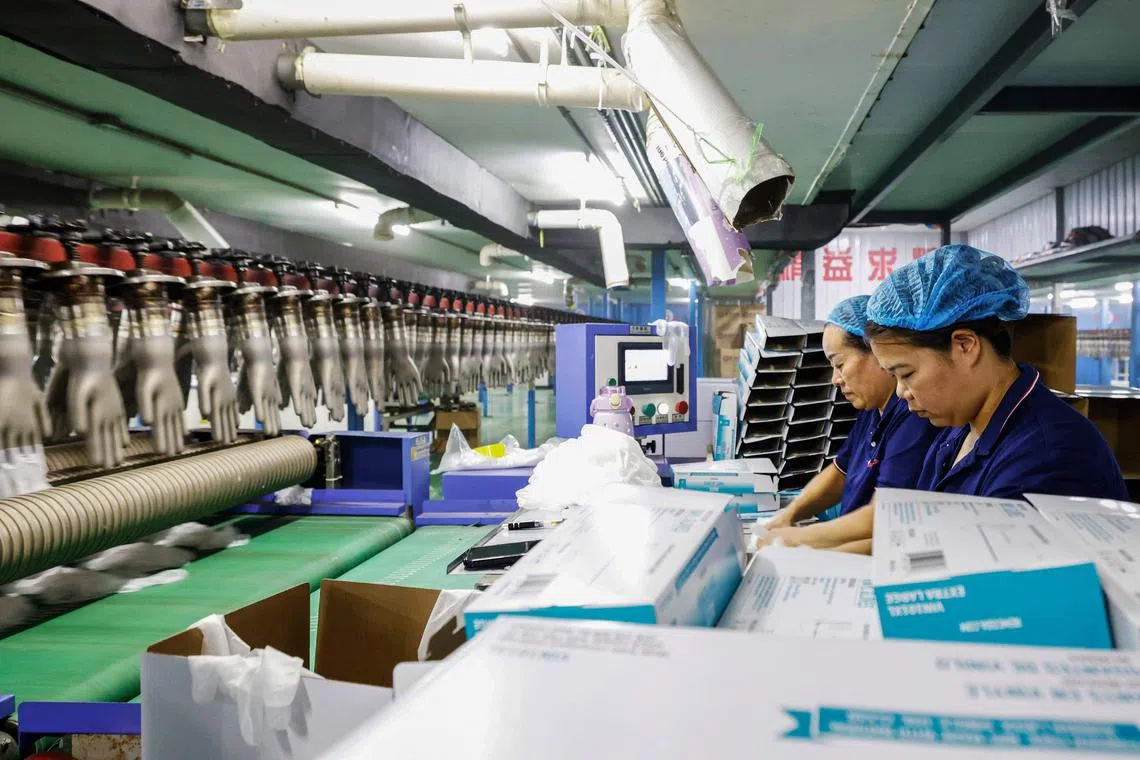Downbeat China factory output, retail sales add to urgency for stronger stimulus
Sign up now: Get insights on Asia's fast-moving developments

China’s industrial output in August expanded 4.5 per cent year on year, slowing from the 5.1 per cent pace in July and marking the slowest growth since March.
PHOTO: AFP
BEIJING – China’s industrial output growth slowed to a five-month low in August, while retail sales and new home prices weakened further, bolstering the case for aggressive stimulus to shore up the economy and help it hit its annual growth target.
The sluggish data released on Sept 14 echoed soft bank lending figures on Sept 13, underscoring weak growth momentum of the US$18.6 trillion (S$24.2 trillion) economy, the world’s second-largest, in the third quarter.
Industrial output in August expanded 4.5 per cent year on year, slowing from the 5.1 per cent pace in July and marking the slowest growth since March, data from the National Bureau of Statistics (NBS) showed on Sept 14.
That missed expectations for a 4.8 per cent growth in a Reuters poll of 37 analysts.
Retail sales, a key gauge of consumption, rose only 2.1 per cent in August, despite the summer travel peak, decelerating from a 2.7 per cent increase in July.
Analysts had expected retail sales, which have been anaemic in 2024, to grow 2.5 per cent.
“The momentum is slowing down... The bottleneck remains domestic demand,” said ANZ senior China strategist Xing Zhaopeng.
China’s oil refinery output fell for a fifth month, while crude steel output in August fell 6.1 per cent from July, suggesting disappointing demand.
Faltering Chinese economic activity has already prompted global brokerages to scale back their 2024 China growth forecasts to below the government’s official target of around 5 per cent.
The economy grew by 4.7 per cent in the second quarter.
“The third-quarter gross domestic product is likely to be lower than Q2 based on current data flows. We expect large-scale stimulus to come soon,” said Mr Xing.
President Xi Jinping urged the authorities on Sept 12 to strive to achieve the country’s annual economic and social development goals, state media reported, amid expectations that more steps are needed to bolster a flagging economic recovery.
ING chief China economist Lynn Song said: “As we are already towards the tail end of the third quarter, time is running low for policymakers to introduce measures to buoy the economy amid numerous headwinds.”
The protracted property slump has led to Chinese consumers cutting back on spending. Some experts have even proposed distributing shopping vouchers to counter the trend.
Premier Li Qiang said in August that the country will focus on stimulating consumption and look at measures to boost household income.
A central bank official said last week that China still has room to lower the amount of cash that banks must hold as reserves, while it faces some constraints in cutting interest rates.
No property sector rebound
Fixed-asset investment rose 3.4 per cent in the first eight months of 2024 from the same period a year earlier, compared with an expected 3.5 per cent expansion. It grew 3.6 per cent in the January-to-July period.
NBS spokeswoman Liu Aihua said at a press conference on Sept 14 that China’s economic operations remain stable, but high temperatures and natural disasters affected growth in August.
Cash-strapped local governments issued bonds at a quicker pace in August for the construction of major projects, with Ms Liu saying the quickening bond issuance and policy initiatives will support investment growth.
Meanwhile, the troubled property sector remains a major drag on growth.
China’s new home prices fell at the fastest pace in more than nine years in August. Only two of 70 surveyed cities reported gains in home prices both in monthly and annual terms in August.
Property sales and investment slumped in the first eight months of the year.
While Beijing has ramped up efforts to rescue the housing market, many analysts say much more aggressive steps are needed to help debt-laden developers and encourage would-be home buyers back to the market.
Some other economic indicators released on Sept 14, too, were unflattering. China’s nationwide survey-based jobless rate climbed to 5.3 per cent in August from 5.2 per cent in the previous month, the NBS said, adding that more college graduates entered the job market to look for offers.
The one bright spot for China recently has been exports, but analysts are not sure for how long the trend of rising exports will continue, given the increasing trade tensions with some countries and regions.
Pinpoint Asset Management chief economist Zhang Zhiwei said investors will shift focus and wonder what will happen to growth in 2025.
“Will the tight fiscal policy stance continue into next year, when global growth will likely slow down and put pressure on China’s exports?” he said. REUTERS


